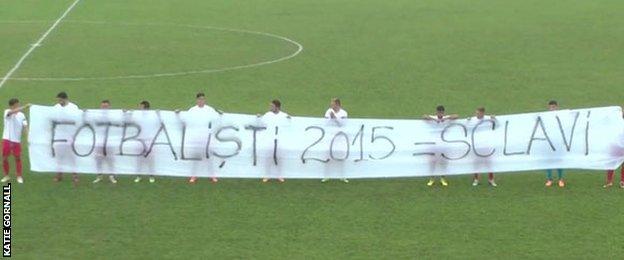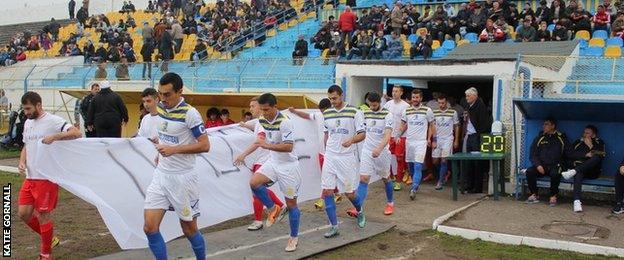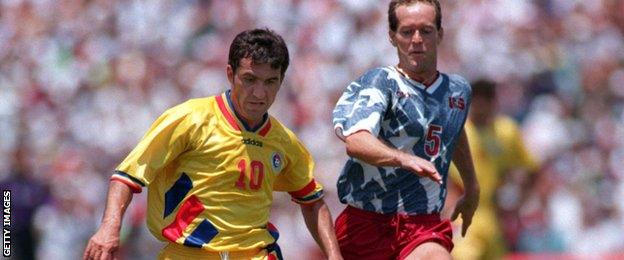Romanian football: Clubs in deep debts keep players as 'slaves'
- Published
Is Romanian football making 'slaves' of players
Florin Anitoiu is desperate. He has travelled 10 hours on an overnight train to meet me in Bucharest. He wants to tell the world how the game he grew up loving is keeping him prisoner.
Anitoiu is a young full-back for Metalul Resita in Romania's second division. He has not been paid for five months and is forbidden from changing clubs.
"Every night I cry and then every morning I'm training on my own," says the 21-year-old. "I don't see how the situation could change in the near future. I can't survive in these conditions - I have debts, bills to pay and eventually I will have to find another job."
Under Romanian law, a club that enters administration does not have to pay or release players until it gets its finances in order. The players are considered assets of the club.
Eventually Anitoiu had enough. Last November he and several team mates staged a boycott. Instead of playing in a match they held up a banner prior to kick off that said "football 2015 = slavery".

Romanian side Metalul Resita have not paid their players in five months since the club entered administration
"We wanted to get a reaction, to show we could not go on this way," said Anitoiu.
However, while many other teams showed their support for the Resita players, so far nothing has changed.
Portuguese player Geraldo Alves, 35, supports Anitoiu's stance and experienced the effects of insolvency during his time with Petrolul Ploiesti.
"I was there for two years and everything was quite good until our president was arrested. He used insolvency to run away from the debts," Alves told BBC World Service.
"It's not only the players affected, it's also the people around football - the doctors, the masseuse, the guys who look after the grass.
"They are not paid for seven or eight months, they don't have anything to eat, don't know how to survive. This is about more than football, it's about being humane with this problem."
One man fighting their corner is Emilian Hulubei, the tireless President of the Romanian Players' Union. His office is lined with hundreds of big blue folders detailing disputes with clubs. He tells me there are currently 14 clubs in the top two divisions in insolvency. And in the third division? Too many to count.

A club that enters administration does not have to pay or release players until it gets its finances in order under Romanian law
"The image of football is very low at this moment in Romania," says Hulubei, who feels that a generation has been lost to the sport as a result.
"Parents don't want their kids to go [and play]. There are a lot of them who have huge talent and they disappear from football because of this problem."
Hulubei wants politicians to intervene to change the law on insolvency. Another player, Raphael Kneif has called on Fifa to intervene. In the meantime, the Romanian FA is trying to improve how clubs are governed.
"I'm really concerned that we at the federation cannot do more in short term," said the Romanian FA president Razvan Burleanu.
"I am not happy to have clubs in insolvency but this is coming from the past. When I became president I didn't find any strategy about football development. Today, we have a clear vision and strategy on what has to be the next steps."
There is, of course, a different way of doing things.
A few hours east of Bucharest on the banks of the Black Sea is the town of Ovidiu. It is the home of FC Viitorul, a club founded by Romania's greatest player Gheorghe Hagi.

Gheorghe Hagi earned 125 caps for Romania and led his country to the 1994 World Cup quarter-finals
One of the stars of the 1994 World Cup, Hagi is involved in every aspect of the club he set up seven years ago. The first team are training and Hagi is a vocal presence on the touchline.
"Firstly I never lost to England," Hagi tells me with a smile. "That team from the 90s was a great team - we were young and talented. The state invested in that period in sport, not like now. They don't invest in the young people."
So does he think we will ever see another golden generation of Romanian football like the 1990s?
"This is my dream, to build a new generation ready to compete - they could be better than us," says the former Barcelona and Real Madrid star.
The Gheorghe Hagi Academy now boasts 300 children from all over the country.
The majority of FC Viitorul's first team came through the ranks and, after back-to-back promotions, they are currently third in the top division. One of the club's brightest prospects is also Hagi's son, Ianis.
"Outside the training session we talk a lot about football trying to make him better," Hagi says of his 17-year-old son who is also the team's vice captain. "I hope he will have a great career because he is a very intelligent young man, he is very technical and has a brilliant mind."
In English, Viitorul means "future", but while Ianis Hagi and the young players at his club plan their futures, Anitoiu and hundreds like him remain in limbo.
"If you're not psychologically prepared, you'll not get through this," says Anitoiu. "But every day I encourage myself that things will get better and in the end I will be a great footballer."
This programme will be broadcast on BBC World Service on Friday and Saturday.
- Published20 June 2016

- Published7 June 2019

- Published2 November 2018
